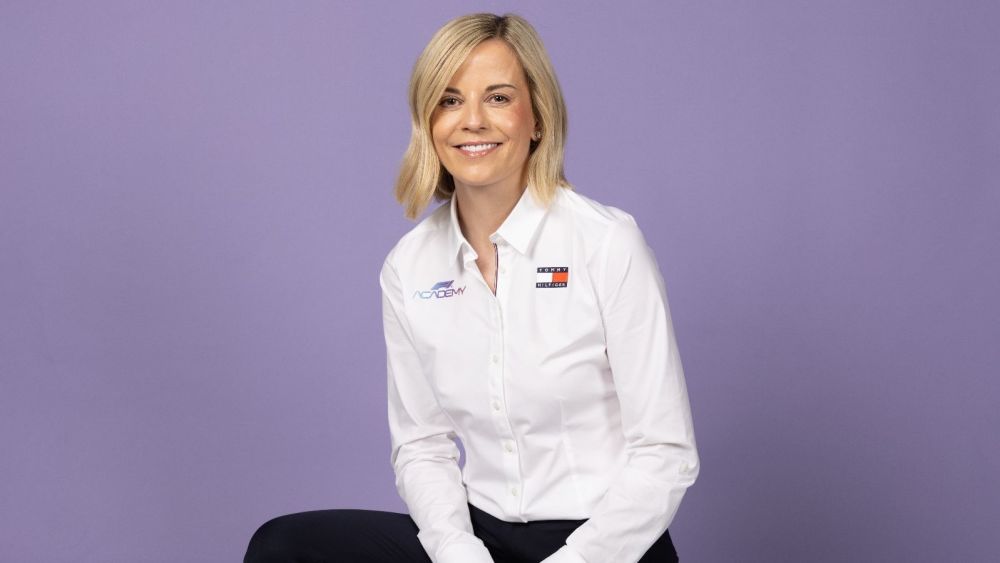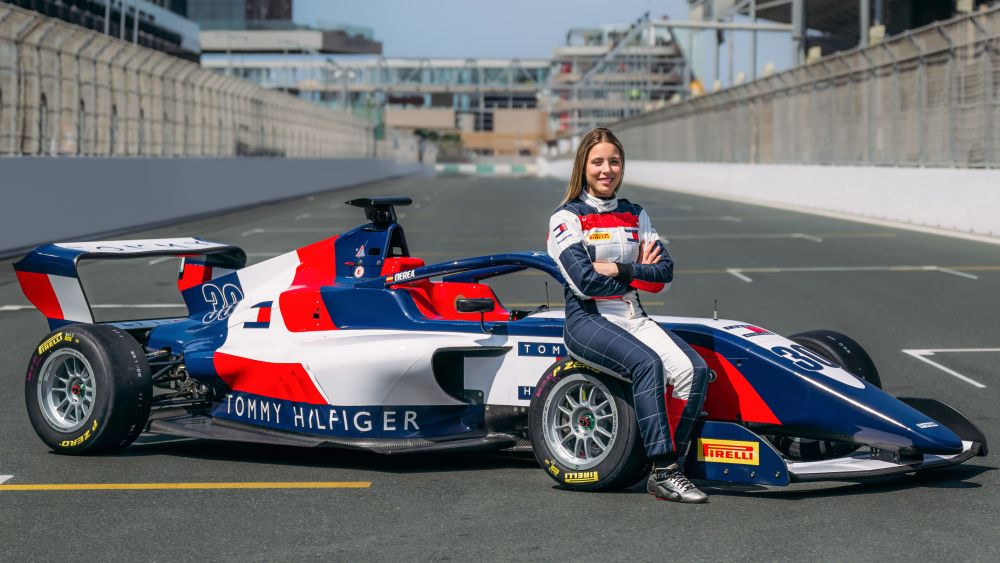Interview
‘We want to be the rocket fuel for progression’ – Susie Wolff on F1 ACADEMY’s mission as it enters a new era

The next chapter in F1 Academy’s story is about to be written, as the second season of the all-female series commences in Saudi Arabia this weekend. We caught up with Susie Wolff, F1 Academy’s Managing Director, about the history-making changes this year and how the series plans to be a catalyst for change both on and off the track.
There’s an undeniable air of excitement surrounding the paddock as F1 Academy prepares to race for the first of seven rounds. Alongside being a support event to Formula 1, the series has made a landmark move in uniting all 10 F1 teams – with each giving their livery and support to drivers outside of their grid for the first time.
“I always like to think of this as my year one really, and I say that with a lot of enthusiasm, but also knowing that I've got to prove that the concept was right,” Wolff says “I'm hugely proud of what we've achieved at this point. It's still just the beginning, I think there's a lot more we can do, but I can already see the positive impact we're having and that's something which is reassuring to know that we're on the right path.
“Obviously having the F1 teams on board and their supporting drivers is also a big foundation of hopefully our mid-to-long term success. It was clear for me that two things had to happen - racing with F1 and having F1 teams onboard and that we managed to achieve. Now we need to prove that we have a platform that can deliver ROI but also be impactful.”

She adds: “When I took on this role, I very much said ‘don't view this as a woman running a thing for women’. It had to be something that the whole sport got behind and I have to really give credit to the F1 teams because they jumped on board with the idea.
“For me, it’s a hugely proud moment that the 10 F1 teams for the first time in the history of the sport united in joining something and gave their liveries to something outside of their own race cars. So, I think the whole F1 Academy team can be proud of that and now we need to deliver.”
‘We are showing that there’s a place for women in our sport’
Alongside the 10 F1 teams, three globally renowned brands have invested in F1 Academy’s goals, with Charlotte Tilbury, Tommy Hilfiger and PUMA joining as Official Partners. Through these partnerships, Wolff believes the opportunities are there to push the sport beyond its traditional fanbase and transform the preconceptions about women in the industry.
“It was very authentic,” says Wolff. “The deals happened easily because they could see the value this platform would bring. PUMA and Tommy Hilfiger are already in the sport and were very keen to support from the very beginning. With Charlotte Tilbury, it's her first time doing sports sponsorship, but there was so much brand alignment. Her feeling of makeup giving you confidence and empowerment - that was something which just very quickly we aligned.
“For us, it’s a hugely beneficial partnership because we reach a new audience. We are reaching an audience of young women that can see motorsport maybe differently to how they viewed it before. We are showing that there's a place for women in our sport, for those that think it's very male dominated and there's no opportunities.”

‘We want to be a global series’
In just over a year since joining F1 Academy, Wolff has secured the buy in from F1 and its respective teams, united in their enthusiasm and belief in the project. Drawing in more attention than ever before, being a part of a Grand Prix weekend was imperative for her – with the drivers benefitting from the exposure and showcasing a pathway for future talent.
“It’s hugely important,” Wolff says. “We've always known that there's a financial barrier to racing, so giving this exposure to the drivers is something that I hope will help them to progress in their careers. We've always said we want to be the rocket fuel for progression, so that I think is really helpful.
“Also, I'm in a situation where I don't have a big pool of drivers waiting to step into F1 Academy. We have to go out there and inspire the next generation. We need to show them that there’s a place for them in our sport and I think that can primarily be achieved by having the exposure and racing with Formula 1.”
The 2024 campaign spans three continents and sees the field venture from Jeddah to Miami, Barcelona, Zandvoort, Singapore and Qatar, before concluding with a season finale at the Abu Dhabi Grand Prix. In addition, each venue has the opportunity to include a Wild Card entrant, with Saudi Arabia’s first female driver, Reema Juffali, in action this weekend, providing a chance to strengthen the female talent pool in that region.
Tackling some of the most demanding circuits on the F1 calendar, Wolff acknowledges the difficult task ahead for the drivers but believes it’s an invaluable opportunity to harness the skills they’ll need to progress up the ladder.
“I definitely think it’s a challenging calendar for our drivers,” she says. “Jeddah is a super-fast track. We go to Miami where they’ll have limited testing, we're also racing in Qatar - I think they are two tracks where, if you ask any F1 driver, they're two of the toughest.

“Hitting the three continents was very important for me when I looked at the calendar because, in the end, we want to be a global series. We need to make sure we are increasing talent globally, so the calendar this year is one I'm really proud of. I know it's a challenge for drivers, but I also think that they will rise to the challenge. This experience of being with a top junior team like PREMA, ART and having the ability to race alongside F1 would be a moment that I hope is hugely valuable for them and for their careers.”
‘It’s not just a racing platform’ – F1 Academy Discover Your Drive
Crucially for Wolff has been the need to facilitate a pathway to progression by removing many of the barriers than have halted talented drivers rising up the ranks. A milestone agreement between F1 Academy and the Formula Regional European Championship by Alpine saw 2023 champion Marta Garcia graduate with a fully funded seat.
Vice champion Lena Buhler also stepped up as a part of the deal, with the top teams being able to run a fourth entry for the top three drivers in the F1 Academy Standings. This season, the top five classified drivers in F1 Academy will also receive FIA Super Licence points.
“I've always said that we would make sure our winner progresses up the ladder and that's something that I think is vital for us,” says Wolff. “We need to show that progression is possible and put our drivers in the best possible situation for success, but what we don't do is just fund them and leave them to go off and find their way.
“We managed to make a change in the regulations in FRECA that got our driver a fourth entry and reduced the steering load. We want to break down the barriers that are stopping women to go on to further success and that's something that I think is fundamental to why we exist. It's not just a racing platform, it’s to make sure that the talent we find has the best chance to go on to further success.”

Whilst the racing draws the most attention, change is also afoot through F1 Academy Discover Your Drive. Encompassing all the grassroot initiatives, the programme has already made an impact in increasing and championing female talent, with its work crucial to the sport as a whole.
The British Indoor Karting Championships saw a 265% increase in cadet-aged females participating in the 2023 qualifiers after Discover Your Drive Karting UK was piloted across six TeamSport venues. Additionally, the programme is also financially supporting nine talented female karters in the Champions of the Future Academy, whilst trackside activations have allowed local children and young people to explore a future in motorsport.
“Discover Your Drive for me is 50% of my focus,” Wolff explains. “We cannot exist as a race series with just the 15 drivers, we need to do much more. The off-track success of F1 Academy is just as important as the on-track success. I think we need to open up the sport to create accessibility, but also just to increase the talent pool in every area of the sport.
“Discover Your Drive is really the umbrella for all of our activities off track, inspiring the next generation to creating that accessibility, making sure we're creating those opportunities that young women get a possibility to access. From the outside, I think Formula 1 has so many fans, but a lot have no idea if they would want to enter the sport, how they do. We have a huge amount of work to do in that space, but it's one that we are really focused and determined on because we feel that that's going to have a big impact.”

F1 Academy’s far-reaching mission can’t be understated, but the drive to make it happen is stronger than ever. At the heart of it, the series isn’t just aiming for short-term success but transforming the sport in a way that’s never been seen before for generations to come.
With the first race of the season coinciding with International Women’s Day, Wolff is steadfast in her belief in F1 Academy’s ability to make a difference. Considering all that has been achieved so far, there’s no limit to the potential for positive change it can bring.
“Of course, I would like it to grow and then flourish,” she notes. “We have to be very strategic, but also, I think we have to always check that what we’re doing is having a positive impact. We’re not existing just for the sake of existing, it needs to be impactful.
“Obviously, we’ve seen from the world of karting the impact we can make when we try to generate more female talent. For me, it’s about onwards and upwards. We’re off to a solid start, but we want to make sure that we are creating more opportunities, inspiring the next generation, and impacting this sport for the better.”